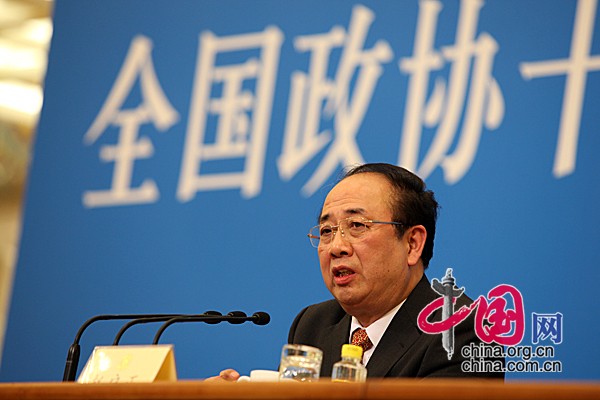China prefers deepening reform despite challenges
- By Wu Jin
 0 Comment(s)
0 Comment(s) Print
Print E-mail China.org.cn, March 3, 2012
E-mail China.org.cn, March 3, 2012
 |
|
Zhao Qizheng at the press conference. |
Having adopted a policy of reform and opening up for approximately three decades, China is now coming to a crucial crossroads where a further step in deepening the structural reform both economically and politically is decisive and imminent.
Yesterday Spokesman of Chinese People's Political Consultative Conference (CPPCC) Zhao Qizheng said the timing for deepened structural reform has arrived.
Zhao wisely buttressed his point by quoting China's prestigious late reformer Deng Xiaoping. He told a huge flock of media in the CPPCC's press conference, a day ahead of the opening of the political advisory body's two-week-long session this year, that the reform would surely be carried forward, despite a future that won't be free of risk.
"Twenty years ago, Mr. Deng Xiaoping said that, the further we press ahead with reform, the stronger our capacity will be to handle and resist risks," Zhao said.
"At this moment, by reviewing of the speech made by Mr. Deng Xiaoping during his southern tour and history of reform and opening up from the early 1990s to now, we realized that this is the time to deepen reform and we will commit to this effort."
Yet the question that might go beyond whether China needs to restructure is how it will achieve such a change.
Economists, statesmen and average citizens may all be well aware of the challenges, such as the constant widening income disparity, a population that ages before becoming wealthy and monopolized inefficiency, are simultaneously complicating the undertaking. China's renowned economist Wu Jinglian warned when giving an interview with The New York Times, that China should avoid the path of becoming trapped in crony capitalism.
Zhao stressed in yesterday's press conference that both China's economic and political reforms should be taken out under the leadership of the Communist Party of China (CPC) and implemented within the framework of socialism with Chinese characteristics.
Yet discussions are still present even when the principal lines are clearly stated. The World Bank's recent publication, titled "China 2030," which provided advice on the reform of China's state-owned enterprises, enraged a certain number of scholars and netizens, who believe the report was meant to poison China by privatizing state assets.
While briefly browsing the report's abstract, Zhao said he didn't find any word that definitely refers to privatization, though his search possibly indicated research on the topic done before the press conference.
"This report is a cooperative project between the World Bank and the State Council Development Research Center," said Zhao. He believes that the fury triggered among scholars and netizens might be caused from the fear of a drain on state assets. But he highlighted that ownership diversification is completely different from privatization.
"This report did mention the ownership diversification of SOEs in China. They said because SOEs in China have a lot of resources, they are obliged to take on more social responsibilities," said Zhao.
"Actually the ownership diversification of SOEs has been an important policy to China since the 15th CPC National Congress. Ownership diversification is not stated as privatization."
World Bank President Robert B. Zoellick said last month in Beijing that the timing for this report is important.
According to Zoellick, a consensus was reached among World Bank and governmental officials in China that "it's better to undertake structural reforms while the economy is growing well."
However, an inseparable part is political structural reform.
"In fact, in China, political structural reform and economic structural reform cannot be separated from each other," said Zhao. "The members of the CPPCC have many discussions on political structural reform, but it is up to the central committee of the CPC and State Council to decide the actual policies they will make on political structural reform."
As a CPPCC member, he declined to specify any detailed discussions on political reform.
Yet he did not shun away from the incident of former Chongqing Vice Mayor Wang Lijun. "According to my knowledge, Mr. Wang Lijun is currently under investigation by relevant departments," Zhao said. However, he denied most of the media's speculation and said that the media had a wild imagination.
"These reports look like puzzle pieces to us, because of a lack of information," he said, "Therefore, these reports are not accurate and some of them are even absurd." He said Wang's incident is an isolated case and recommended no excessive speculation.
Wang was spotted leaving the United States Consulate in southwest China last month and was later rumored to be enjoying "vacation-style" treatment.






Go to Forum >>0 Comment(s)